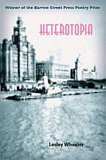Reviewed by Moira Richards
HETEROTOPIA
by Lesley Wheeler
Barrow Street Press, 2010
PO Box 1831
Murray Hill Station
New York, NY 10156
ISBN-13: 978-0-9819876-2-0.
77 pages, US$ 16.95
www.barrowstreet.org
The title piece of Lesley Wheeler’s collection comprises a short selection of quotes followed by six untitled but numbered poems, each one a different form, and I’m delighted by this display of expertise–especially the use of subtle sound-as-rhyme in some of the schema–before I even get to engaging fully with the content of the works. These serve as background and introduction to the whole collection and the section numbered “5” (prose poetry) begins:
heterotopia: enables utopia elsewhere (slave trade); physical and phantasmatic, the room one glimpses in a mirror (an idea of a city derived from stories)…
The city of this book is Liverpool. Liverpool, one time centre of the British slave trade, the city that pioneered research and treatment of malaria and sleeping sickness and, of course, the city synonymous with the musical revolution that was the Beatles. The city is also integral part of the narrator’s heritage but Heterotopia’s narrator is not Liverpudlian; she has only memories, second-hand memories, gleaned from her mother who emigrated from there many years back to marry in the USA, so that, a little regretfully,
When I say
Liverpool I mean an unreal city, purified
of reeking detail like a fairy tale
yet, conversely,
This blitzed, hungry, smoke-thin world
invented me, and its ardent liesare my birthright.
(Forged)
Those lines reminded me of that other meaning of heterotopia: a body organ—functioning, although shifted, displaced from its normal place in the body. I was a child of first-generation emigrants and grew up never knowing, only knowing of, my country of birth and my extended family. Cousins, uncles, aunts and grandparents were just names, anecdotes and snapped faces in Christmas-time cards, and the loss of them and that closeness is an emptiness still within me today.
Lesley Wheeler’s words capture the moods of not-quite/what-might-have-been; that ineffable missing-of-something you never knew…
…The room
of my mouth remains full of ghosts.
Something is almost gone, a fume
of sound and all that it meant.(Her Voice in My Mouth)
Central to the collection is the section entitled “Legends,” a series of more than a dozen poems, headed with dates and sequenced 1940 through 1962–all stories, retold, of people and places and times the narrator never knew, pieced together from stories and history books. Here, a snippet of the insight the section gives into the narrator’s mother’s “escape”:
When the sirens cried,
my grandmother hustled four
babies into the mud-crowned
steel of the backyard shelter
and hooded them
by turning her back on the planes—
speck of grit in a wet cityThe window glass blew
into the parlour
petals
(Bringing in the May, 1941)
Oral histories can’t really survive in today’s world of words, no matter how carefully you catch the words, preserve your treasures in poems, and in the end, Lesley Wheeler’s collection stares that fact in the face with exquisite threnody…
My grandmother had a song for her name and a song for
driving home and a song for childish love, but my
children will not learn them.
…
Listen to the foam of my voice and I will pour it for you,
all the tiny stories in one intoxicating stream,
catching each other’s sparkle,
now, before the taste disappears.
(Oral Culture)
Heterotopia’s poems read in many ways, but the pivot for me is the strain of lament; I enjoyed it greatly as a book of loss, displacement.